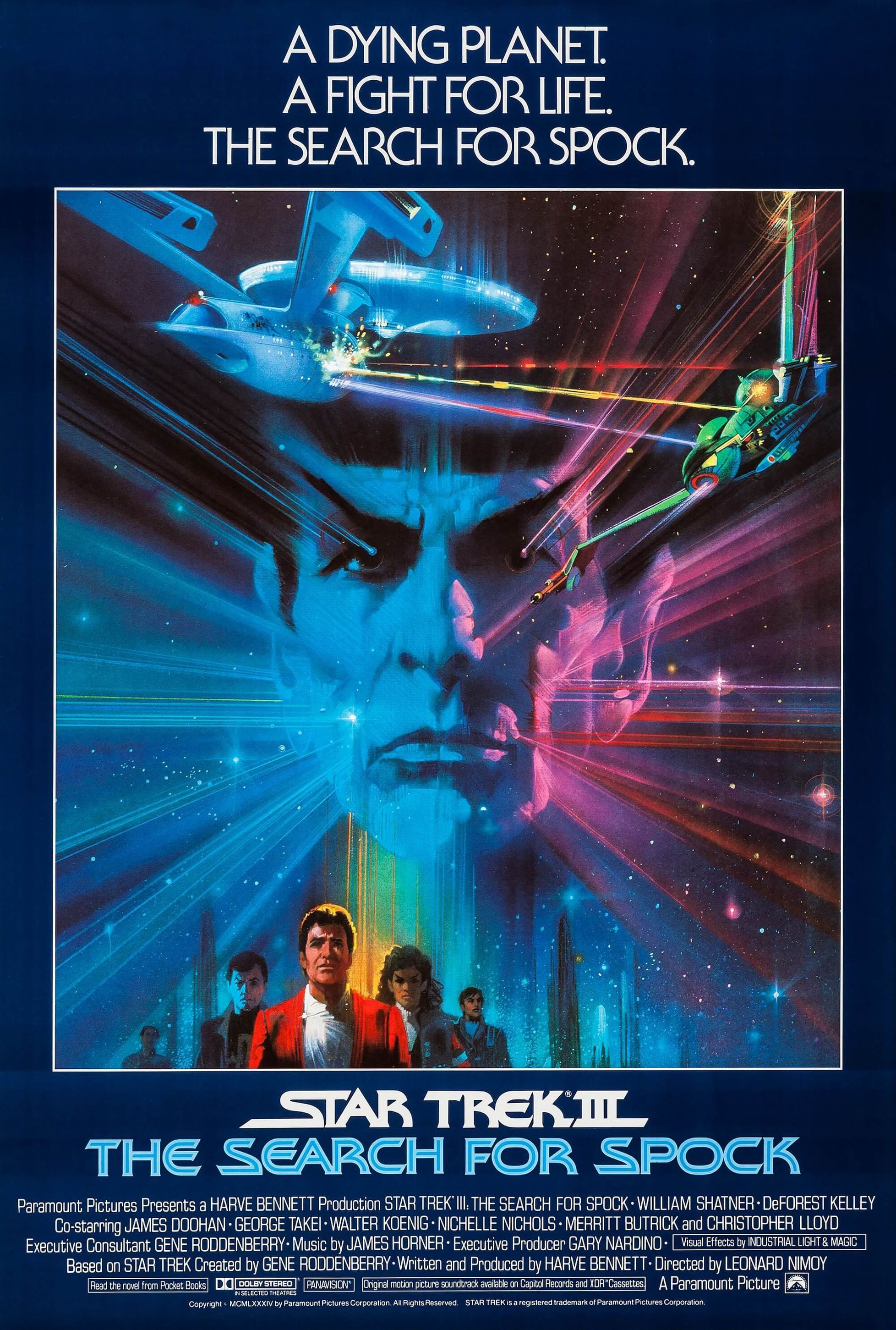William Shatner and Leonard Nimoy became legends thanks to their acting in Star Trek, but each also got to put on their director’s hat for entries in the Star Trek original cast movie series. Nimoy became the first Trek actor to transition to directing when he took the reins for Star Trek III: The Search for Spock. The Spock star returned to direct Star Trek IV: The Voyage Home. Not to be outdone by his on-screen second-in-command, Shatner received his own directing chance with Star Trek V: The Final Frontier.
The Captain Kirk actor cited a contract clause for him and Nimoy to remain equal in terms of pay and role, and took on a bigger creative voice in the follow-up to Nimoy’s successful Star Trek IV. Nimoy’s Trek vision, most fully realized in The Voyage Home, led to a film reflective of someone who has thought deeply about the franchise and its themes, and relates to creator Gene Roddenberry's humanistic values. When Shatner was given a chance to display his vision for Trek, it reflected someone who possessed his own rather odd ideas.
The men who played Kirk and Spock indeed displayed wildly different thematic interests, and levels of competence, in the three Star Trek movies they collectively directed.
3Star Trek V: The Final Frontier
Directed by William Shatner
Shatner began writing what would become Star Trek V: The Final Frontier even before he was confirmed to direct the movie. In his book Star Trek Memories, co-authored with frequent literary collaborator Chris Kreski, the Captain Kirk actor revealed what inspired the story, recalling how he, for some reason, became fascinated with televangelists and their charismatic pull, calling out such money-grubbing religious figures as false prophets.Star Trek V’s rogue Vulcan Sybok (Laurence Luckinbill) is Shatner’s take on a fire-and-brimstone preacher offering salvation, though unlike the TV charlatans that inspired him, the character actually does possess mysterious powers. It isn’t long before Sybok has used his psychic abilities – enhanced no doubt by his being a Vulcan – to take over the Enterprise and its crew, with the notable exception of Kirk, who never buys into the mystic’s claims.
Shatner’s story isolates Kirk from McCoy and Spock, both of whom are taken in by Sybok. Kirk being positioned as a lone hero who has to save everyone, without the assistance he normally receives from his crew, is just one reason The Final Frontier has been accused of betraying the Star Trek spirit in favor of boosting Shatner’s ego. The movie’s silly comedy moments have also come in for criticism, though it’s arguable that the jokes are the only thing saving the film from being a completely dreary experience.
Star Trek was enough of a juggernaut in 1989 for what Roger Ebert called “the worst” movie in the series to still gross $63 million on a budget of $33 million. The film was derided by more critics than just Ebert, and hasn’t seen much change in its reputation over the years, as indicated by its 23% fresh rating on Rotten Tomatoes. Shatner came in for the worst critical drubbing, his story being bashed as pretentious, his direction as dull, and his ego as out-of-control.
2Star Trek III: The Search For Spock
Directed by Leonard Nimoy

The death of Nimoy’s iconic character at the end of The Wrath of Khan left fans facing the prospect of a Spock-less Star Trek. Their fears were unfounded, however, as Star Trek II had actually re-invigorated Nimoy, leaving him excited to bring Spock back to life, with himself in the director’s chair. Nimoy’s contribution to the resulting film was indeed mostly directorial, as he only plays Spock at the very end of the movie, with numerous other actors portraying a rapidly aging, re-animated version of the Vulcan from infancy to adulthood.
Reviving Spock was easy enough, given the sequel-bait clues left in the final scenes of The Wrath of Khan: Spock’s mind-melding with McCoy became a handy explanation for how the Vulcan’s consciousness could live on, while the life-generating powers of the Genesis device took care of Spock’s physical resurrection. Both Shatner and McCoy actor DeForest Kelley talked about their initial discomfort at being directed by their long-time co-star Nimoy, but everyone soon became accustomed to the arrangement, and things went smoothly.
Budgeted at $16 million, Star Trek III made $87 million at the box office, finishing as the 8th-highest-grossing movie of 1984, one of cinema history’s biggest years. The Search for Spock’s 78% fresh rating on RT reflects the view that the movie is strong, but not one of the very best Trek films. Nimoy’s direction received praise, as did the performances, while the story was somewhat criticized. The movie snagged six Saturn Award nominations, including Best Picture.
Trek fandom generally approves of Star Trek III, widely cited as the series entry that best captures the spirit of the show, coming after the slow-moving epic grandeur of Star Trek: The Motion Picture, and the broodingly dramatic heaviness of The Wrath of Khan.
1Star Trek IV: The Voyage Home
Directed by Leonard Nimoy“The One With the Whales” took on its environmental theme thanks to director Nimoy, who had more creative freedom after delivering a hit with Star Trek III. Nimoy’s whole conception of the film was indeed a departure from the earlier movies as well as TOS. As related in the 1995 book The Art of Star Trek, the Spock star mandated a story with "no dying, no fighting, no shooting, no photon torpedoes, no phaser blasts, no stereotypical bad guy.”
Leaving out these classic action elements, while emphasizing humor and social commentary, made for a film that was more accessible to general audiences. But it was also more bound to annoy hardcore Trek fans who expected dying, fighting, shooting, photon torpedoes, phaser blasts and a stereotypical bad guy.
Shatner and Nimoy's Star Trek IV salary demands were partly responsible for Paramount's decision to cast unknown, and therefore inexpensive, actors in Star Trek: The Next Generation.
Star Trek IV mildly divides the Trek community to this day. But one can only imagine the reaction the fandom would’ve had if Eddie Murphy had been cast in the film, as both he and the producers initially wanted. Murphy ultimately passed on the role written for him, doing The Golden Child instead. Murphy in a Star Trek film might have broken some people’s brains, but thankfully the wacky idea never came to fruition.
Unappreciative hardcore fans aside, Star Trek IV’s general reputation is strong, as indicated by its 81% fresh rating on Rotten Tomatoes. The Voyage Home is also the rare Trek movie to make a major splash at the Oscars, snagging four nominations: Best Cinematography, Best Sound, Best Sound Effects Editing and Best Original Score. The 1987 Saturn Awards predictably heaped even more praise on the film, giving it 11 nominations, the same number James Cameron’s Aliens received that year.
Paramount may have had misgivings about the story concocted as per Nimoy’s mandates, but the Spock actor was vindicated in the end, as Star Trek IV went on to gross $109 million domestically, making it the only Star Trek original cast movie to cross the $100 million mark. After Shatner’s directing turn in the sequel Star Trek V, the series returned to old hand Nicholas Meyer for Star Trek VI, the swan song for the full original cast.
But Nimoy and Shatner would not be the last Trek actors assigned the task of directing a franchise movie. Star Trek: TNG's Riker star Jonathan Frakes was handed the keys to Star Trek: First Contact, and did a good enough job to be given the same assignment on Star Trek: Insurrection. Both Nimoy and Frakes demonstrated a genuine understanding of Star Trek in their directorial assignments, while Shatner seemed only interested in glorifying himself.


-1754209978-q80.webp)
